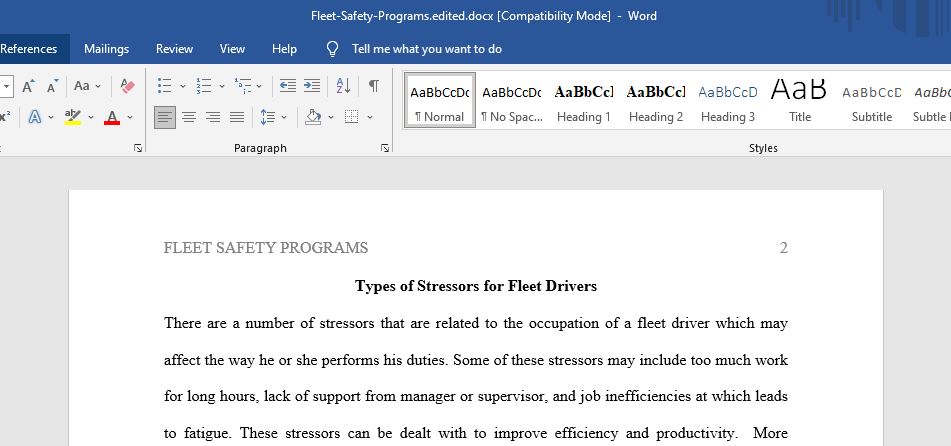Define three types of stressors that can impact a fleet driver’s work environment.
What are three possible solutions for correcting these stressors to improve safety and productivity? Your response should be at least 75 words in length.
2. Analyze the safety implications that a workspace environment within a fleet vehicle present to the driver. What are some solutions for correcting and maintaining an improved area to safely operate the vehicle? Your response should be at least 75 words in length.
3. Identify the speed that is predetermined for a fleet driver to have a minimum stopping sight of 115 feet. How can a fleet driver use this information to successfully manage their sight distance when operating a commercial vehicle? Your response should be at least 75 words in length.
4. Explain how aerodynamics are an important factor in maintaining vehicle control. How do steering and tires play an important role in also maintaining control of the fleet vehicle at all times? Your response should be at least 75 words in length.
5. All transit companies have policies and procedures regarding safe driving practices. Identify and discuss at least three of the human factors for consideration for public transit buses. Your response should be at least 200 words in length.
6. Describe how a fleet can utilize the safety management system to ensure accident anticipation and avoidance. What are the differences between an unavoidable accident and a preventable collision? Your response should be at least 200 words in length.
7. Explain how safety programs can be used as incentives by companies to help reduce on-the-job accidents. List at least five important factors that help companies find the right balance between safety and providing rewards for safe actions while operating within a fleet. Your response should be at least 200 words in length.
8. Review the steps in developing a fleet safety award program. In reviewing each of these recommended steps, identify at least three program parameters that you feel would be most effective in communicating safety to employees and would also result in increased on-the-job safety practices. How are these effective, and what do you think can result from the use of these parameters? Your response should be at least 200 words in length.
9. Compare the differences between a prospective study and a retrospective study. How does each evaluate the effectiveness of a company’s accident prevention efforts? Your response should be at least 200 words in length.
10. Why is it important for not only employees to be accountable within a safety program but also employers? How does a continuous alignment of accountability foster communications between a company and its employees within a safety culture? Your response should be at least 200 words in length
Answer preview:
Word:1850

